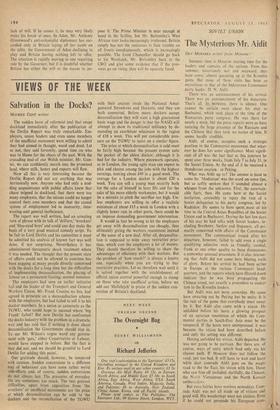VIEWS OF THE WEEK
Salvation in the Docks?
MAURICE GENT writes:
The sudden burst of reformist zeal that swept dockland immediately after the publication of the Devlin Report was truly remarkable. Em- ployers, union leaders and even some members of the unofficial movement were willing to admit they had sinned in thought, word and deed. Let us not, they said fervently, spend time on who was to blame for the chaos of the past. With the crusading zeal of our Welsh minister, Mr. Gun- ter, we can confidently march into the promised land, where milk, honey and exports will flow.
Now all this is very interesting because the Devlin Report did not say anything that was intrinsically new. Anyone who bad only a nod- ding acquaintance with public affairs knew that chaos reigned in dockland, that there were too many employers, that the unions could no longer control their own members and that the casual system of employment led to insecurity, time- wasting and general inefficiency.
The report was well written, had an arresting turn of phrase with its talk of 'drifters,' wreckers' and `blue-eyed boys' and could one day make the basis of a very good musical comedy script. To be fair to Lord Devlin and his committee it must be admitted his analysis of known fact was well done, if not surprising. Nevertheless it has administered therapeutic shock treatment where it was needed. The thought that the present state of affairs could not be allowed to continue has been nagging at many people directly concerned with the docks for a long time but the difficulties of implementing decasualisation, the placing of labour on a permanent footing, seemed immense.
The employers had seen an earlier initiative fail and the leader of the Transport and General Workers Union, Mr. Frank Cousins no less, had agreed in principle on a decasualisation scheme with the employers, but had failed to sell it to his docker members. In a union as autocratic as the TGWU, who could hope to succeed where `big Frank' failed? But now Devlin has confronted the docks industry with the problem in a dramatic way and has said that if nothing is done about decasualisation the Government should step in. To use Mr. Wilson's vogue word any govern- ment with `guts,' either Conservative or Labour, would have stepped in before. But the fact is they did not, and we should be grateful to Lord Devlin for adding this point.
Our gratitude should, however, be tempered with caution. Sudden conversions to a different way of behaviour can have some rather weird side-effects and, of course, sudden conversions do not always last. The pressures of everyday life are sometimes too much. The two greatest difficulties, apart from opposition from `the wreckers' or unofficial movements are the price at which decasualisation can be sold to the dockers and the reconciliation of the TGWU with their ancient rivals the National Amal- gamated Stevedores and Dockers, and they are both connected. Before many dockers accept decasualisation they will want a high guaranteed basic wage and the danger is that the NASD will attempt to show its traditional militancy by de- manding an exorbitant minimum in the region of £18 a week. This will put considerable pres- sure on the TGWU to insist on a similar figure.
The price at which decasualisation is sold must be fairly high because the present system suits the pocket of the ablest docker, although it is bad for the industry. Where piecework operates, as in London, the young agile man can expect to pick and choose among the jobs with the highest earnings, making about £40 in a good week. The average for a London docker is about £20 a week. You can sell a young man security both for the sake of himself in later life and for the sake of his more elderly workmates, but it would be a mistake to pitch the sacrifice too high. Un- less employers are willing to offer a realistic minimum of about £15 a week in London with a slightly lower rate in other ports, there could be an impasse demanding government intervention.
It would in fact be wrong to let the employers get away with decasualisation too cheaply, thus ultimately giving the workers resentment instead of the sense of a new deal. After all, decasualisa- tion is supposed to wipe away restrictive prac- tices, which cost the employers a lot of money. They should therefore be willing to share the advantages of efficiency with their workers. But the problem of `how much?' is always a knotty one, especially when you are trying to buy restrictive practices. Let ns therefore wait until it is solved together with the establishment of official union control powerful enough to stamp on those who take unofficial action, before we add our `Hallelujah' in praise of the sudden con- version of Britain's dockland.






























 Previous page
Previous page